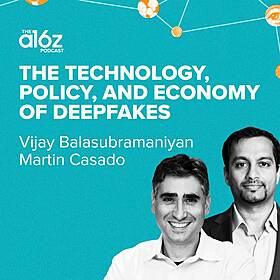
The Deepfake Dilemma: The Technology, Policy, and Economy
11 October 2024 - 34 minsDeepfakes—AI-generated fake videos and voices—have become a widespread concern across politics, social media, and more. As they become easier to create, the threat grows. But so do the tools to detect them.
In this episode, Vijay Balasubramaniyan, cofounder and CEO of Pindrop, joins a16z’s Martin Casado to discuss how deepfakes work, how easily they can be made, and what defenses we have. They’ll also explore the role of policy and regulation in this rapidly changing space.
Have we lost control of the truth? Listen to find out.
Resources:
Find Vijay on Twitter: https://x.com/vijay_voice
Find Martin on Twitter: https://x.com/martin_casado
Stay Updated:
Let us know what you think: http...

a16z's New Media Playbook
Erik Torenberg, Ben Horowitz, and Marc Andreessen discuss how the media landscape has fundamentally changed and what a16z is doing about it. They cover why offense beats defense, why individuals now matter more than corporate brands, why speed wins in the new media landscape, and the difference between oral and written culture on the internet.
48 mins
27 February Finished

When Giants Don’t Go Public: Inside the $5 Trillion Private Tech Market
Bloomberg's Odd Lots hosts Joe Weisenthal and Tracy Alloway speak with David George, general partner at a16z and head of the firm's growth fund, about why $5 trillion in tech market cap now sits in the private markets, how that figure has grown 10x in a decade, and what it means for founders, employees, and investors. They also cover SPVs, tender offers, the collapse of legacy software valuations, and why AI companies may be speed-running the path to public markets. This episode originally aired on Bloomberg's Odd Lots podcast.
47 mins
26 February Finished

Ben Horowitz: RSI, Crypto as AI Money, & Classified Physics
Moonshots host Peter Diamandis speaks with Ben Horowitz, cofounder and general partner at a16z, alongside regular cohosts Salim Ismail, Dave Blundin, and Dr. Alexander Wissner-Gross, about whether AI can or should be paused, what happened when Horowitz told a Biden administration official that regulating AI means regulating math, why crypto is the natural money for AI agents, and why the gap between AI capability and societal adoption may be wider than people think. This episode originally aired on Peter Diamandis's Moonshots podcast.
1 hour 48 mins
23 February Finished

Patrick Collison on Stripe’s Early Choices, Smalltalk, and What Comes After Coding
Michael Truell, CEO of Cursor, sits down with Patrick Collison, CEO of Stripe and an investor in Anysphere, to talk about Collison's history with Smalltalk and Lisp, the MongoDB and Ruby decisions Stripe still lives with 15 years later, why he'd spend even more time on API design if he could do it over, and whether AI is actually showing up in economic productivity data. This episode originally aired on Cursor's podcast.
52 mins
20 February Finished

AI’s Capital Flywheel: Models, Money, and the Future of Power
a16z's Martin Casado and Sarah Wang join Latent Space hosts Alessio Fanelli and Swyx to discuss what makes this AI investment cycle unlike anything in the history of venture capital. They cover why the lines between venture and growth, apps and infrastructure are blurring, how frontier model companies can raise more than the aggregate of everyone built on top of them, and why the industry-wide gap between perception and reality has never been wider.
57 mins
19 February Finished

From Copilots to Agents: Rebuilding the Company Around AI
a16z's Angela Strange and Gabriel Vasquez speak with Carlos García Ottati, founder and CEO of Kavak, about building Latin America's largest online used car marketplace across Mexico, Brazil, Chile, Argentina, and the Middle East. They discuss why building in emerging markets means constructing four businesses underneath your business, how Kavak replaced copilot tools with AI agents handling 90 to 95% of customer interactions, and what it took to go flat for a year during the transition before growing four times on the other side.
59 mins
18 February Finished





















